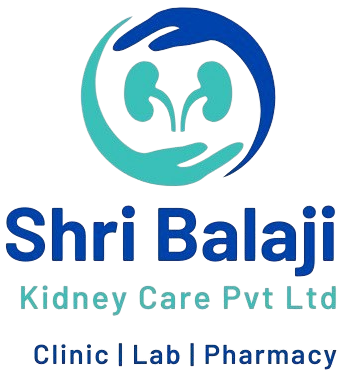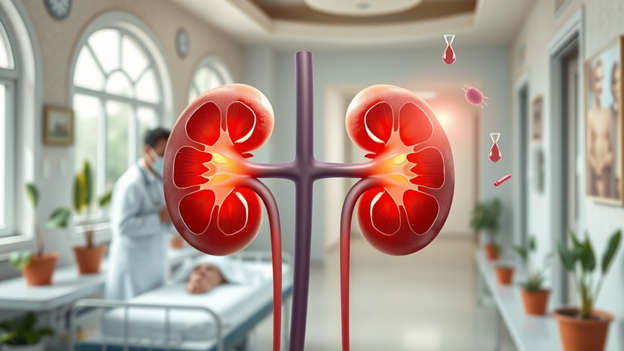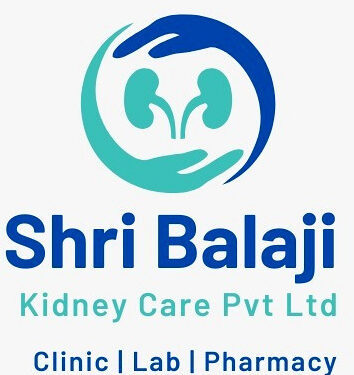Acute kidney disease, also known as AKI disease, is a sudden condition where the kidneys stop working well. It’s a big deal because your kidneys are essential for cleaning your blood, balancing fluids, and other vital functions. If you live in India, knowing about acute kidney disease is crucial due to its rising incidence. Awareness can help you spot issues early and perhaps prevent serious health problems. AKI symptoms often appear suddenly, making it vital to understand this disease and how it affects you. So, let’s dive into what AKI disease is and how it can be managed efficiently and quickly.
What is Acute Kidney Injury (AKI)?
Your kidneys have a big job. They filter waste, balance bodily fluids, and help control blood pressure. But sometimes things go wrong. That’s where acute kidney disease definition comes into play. Acute kidney disease happens fast and can seriously affect kidney function quickly. This is different from chronic kidney disease, which occurs gradually over time. Unlike chronic conditions, AKI disease is often a medical emergency and requires immediate attention. The tricky part about managing AKI symptoms is being aware of how quickly the condition can develop and how serious it can become if not addressed promptly.
Highlighting the Root Causes of AKI in India
There are several causes of AKI disease in India, impacting many lives. Some leading causes include:
- Diabetes and Hypertension: These are significant contributors to AKI disease. Manage your blood sugar and blood pressure to protect your kidneys.
- Limited Healthcare Access: Not everyone has quick access to medical care, which can delay diagnosis and treatment.
- Prerenal Causes: These happen when there’s a sudden drop in blood flow to the kidneys. Dehydration and heart failure can lead to this.
- Intrinsic Renal Causes: This happens when your kidneys are directly impacted. Causes include infections or inflammation.
- Postrenal Causes: This means something is blocking the flow of urine. Examples include kidney stones or enlarged prostate.
Understanding these causes can help you and your healthcare provider manage potential risks better and take steps to prevent AKI symptoms.
Identifying the Symptoms of AKI
Recognizing AKI symptoms helps you seek timely care. Here’s what to look for:
- Common Symptoms: These include fatigue, swelling, and changes in urine output.
- Less Common but Dangerous Symptoms: Conditions like confusion or chest pain need immediate attention.
- Subtle Symptoms: Sometimes, AKI symptoms are hard to detect. They might be mild or absent, causing a delay in seeking help.
In any case, tell a doctor if you or a loved one shows any of these signs. Early healthcare intervention can make a big difference in managing AKI.
Diagnosing AKI: The Path to Early Intervention
Getting diagnosed early is key when it comes to managing AKI. Several tests can help:
- Blood Tests: They check for waste buildup or electrolyte imbalance.
- Urine Tests: These can show signs of kidney damage.
- Imaging Tests: Ultrasounds or CT scans give a visual look into your kidneys.
Sometimes, a kidney biopsy is necessary. This involves taking a small sample of kidney tissue to understand the cause better. It sounds daunting, but it can be crucial for effective treatment and managing AKI.
Comprehensive Treatment Options for AKI
Handling the root causes of AKI disease is key. Here are some methods:
- Addressing Underlying Issues: Treat illnesses like diabetes or infections.
- Supportive Care: This can include fluid management and medicine changes.
- Dialysis: When kidneys can’t function well, dialysis can help filter waste from the blood.
These steps aim to support kidney recovery and prevent further damage. Talking to healthcare professionals about your care options is key in managing AKI effectively.
Preventive Measures for Acute Kidney Injury
Avoiding AKI symptoms is possible if you follow some preventive steps:
- Stay Hydrated: Drink enough water daily.
- Avoid Harmful Drugs: Some medications can put stress on your kidneys.
- Manage Chronic Conditions: Keep an eye on long-term health issues.
- Regular Check-Ups: Visit your doctor regularly, especially if you’re at risk.
Following these tips not only helps your kidneys but also promotes overall health, reducing your chances of developing AKI disease.
Long-term Outlook and Recovery for AKI Patients
The good news is, recovery from AKI disease is possible. Some patients regain full kidney function over time. Still, it’s vital to be aware of possible complications. Continuous monitoring helps you stay proactive. Routine tests can show how well kidneys are healing. Keeping an open dialogue with your healthcare provider is critical, ensuring you receive the best care for potential recovery challenges.
Seeking Medical Attention: When and Why
Watch for certain signs needing quick medical care:
- Severe AKI symptoms, like unexplainable fatigue or swelling.
- Other alarming signs include sudden confusion or decreased urine output.
Going to a doctor early makes treatments more effective. Don’t hesitate to seek help if you feel something is wrong. Early attention is crucial in managing AKI and ensuring better health outcomes.
Conclusion: Embracing Awareness and Prevention
In conclusion, understanding AKI disease is crucial. We covered its causes, symptoms, and prevention tips. Awareness is your ally in avoiding severe kidney problems. By staying informed, you make better choices for your health. Prevention and smart decisions help keep AKI symptoms at bay. Take action now to stay healthy and protect those essential kidneys.
Don’t wait! Visit Krishna Patil for expert kidney care and personalized advice to protect your kidney health. Take control now for a healthier future!



